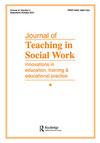Stress and Wellbeing of Social Work Students in Field Instruction
IF 0.9
Q3 EDUCATION & EDUCATIONAL RESEARCH
引用次数: 0
Abstract
ABSTRACT The study explored the professional and personal stress experienced by the social work students at the Bicol University, Daraga Campus in the Philippines during their field instruction. Furthermore, it sought to discuss the implications for social work education, particularly in the field instruction program. It employed qualitative methods to gather and analyze the data. The study revealed significant and interrelated themes based on the qualitative analysis derived from the conducted focus group discussion and review of documents. In terms of the professional stressors, the following were identified: organizational processes, interpersonal relationships with the staff, agency politics, physical set-up, and characteristics of clients. In terms of personal stressors, the respondents identified the following: academic requirements and pressure, family issues and concerns, financial limitations, and health conditions. These situations affected the students’ physical, psychological, emotional, social, and spiritual well-being. The results of the study suggest that integrating subjects related to the prevention of stress and the promotion of self-care in the social work curriculum and in supervision can help social work students to better cope with professional stress, academic responsibilities, and personal challenges. It may lead to future social workers who know how to maintain healthy well-being, making them more effective, competent, and ethical practitioners.社会工作专业学生在现场教学中的压力与健康
摘要本研究探讨了菲律宾达拉加校区比科尔大学社会工作专业学生在现场教学期间所经历的职业和个人压力。此外,它试图讨论对社会工作教育的影响,特别是在实地教学计划中。它采用了定性方法来收集和分析数据。根据焦点小组讨论和文件审查得出的定性分析,该研究揭示了重要且相互关联的主题。在职业压力源方面,确定了以下因素:组织过程、与员工的人际关系、机构政治、物理设置和客户特征。在个人压力源方面,受访者确定了以下内容:学业要求和压力、家庭问题和担忧、经济限制和健康状况。这些情况影响了学生的身体、心理、情感、社会和精神健康。研究结果表明,将与预防压力和促进自我护理相关的科目纳入社会工作课程和监督中,可以帮助社会工作学生更好地应对职业压力、学业责任和个人挑战。它可能会让未来的社会工作者知道如何保持健康,使他们成为更有效率、更有能力和道德的从业者。
本文章由计算机程序翻译,如有差异,请以英文原文为准。
求助全文
约1分钟内获得全文
求助全文
来源期刊

Journal of Teaching in Social Work
EDUCATION & EDUCATIONAL RESEARCH-
CiteScore
1.20
自引率
0.00%
发文量
36
期刊介绍:
The Journal of Teaching in Social Work fills a long-standing gap in the social work literature by providing opportunities for creative and able teachers—in schools, agency-based training programs, and direct practice—to share with their colleagues what experience and systematic study has taught them about successful teaching. Through articles focusing on the teacher, the teaching process, and new contexts of teaching, the journal is an essential forum for teaching and learning processes and the factors affecting their quality. The journal recognizes that all social work practitioners who wish to teach (whatever their specialty) should know the philosophies of teaching and learning as well as educational methods and techniques.
 求助内容:
求助内容: 应助结果提醒方式:
应助结果提醒方式:


